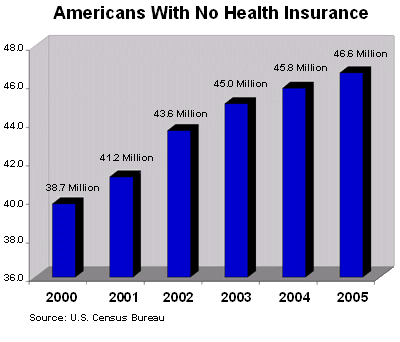
"Does this sound more like your husband?" asked the neurosurgeon, as my very-worried wife was escorted into the hospital's operating room in November of 2004. "Yes," she tearfully replied, as she walked in on a somewhat lucid discussion about medical tort reform that I was having with the man who had very possibly just saved my life -- a conversation I would not have been capable of having a half hour before.
In the previous 20 minutes or so, the neurosurgeon had drilled a hole straight through my skull and drained what looked like about a beer can's worth of blood that was exerting enormous pressure on the left side of my brain. An acute subdural hematoma, in clinical speak. The previous seven to ten days remain a blur over two years later as I was, functionally speaking, out of my mind during that period.
Perhaps mercifully, the 2004 presidential election fell right in the middle of my pre-surgery blind-spot, so I have no recollection of the day 60 million people, more brain damaged than I was at the time, voted for George W. Bush.
But fortunately, the symptoms of what we at first thought was a sinus infection debilitating headaches, dizziness, slurred speech and spontaneous nausea -- became so profound that my sinus doctor ordered a full brain MRI. The test revealed a giant blob of blood on my brain and I was rushed into emergency surgery.
With a flawless procedure performed by a well-known brain surgeon and an exceptional ICU staff, I was released in only three days and was quickly on the road to what has been a full recovery.
"Do people still die from a subdural hematoma?" I asked one of the nurses, while still in my ICU bed. "Yes," she replied. "Just not people like
you." When pressed for what she meant by that statement, she said "People with good health insurance, who can afford a neurosurgeon from Scarsdale don't die from these as much."
That comment has stuck with me and, as I researched the subject further, I found that a large number of people do indeed still die from the inability to easily obtain a 20-minute surgery, a procedure that has become a simple, routine operation for all neurosurgeons.
With a new Democratic Congress about to broach the subject of some degree of universal health care -- and with Republicans undoubtedly poised to remain as steadfastly hostile to the issue as they have for decades -- this becomes a very personal issue as I ask what seems to me to be an obvious question: Why should anyone die because they're not like me?
I'm inherently worth no more as a person than any other husband, father and friend and yet, in the case of a medical crisis like mine -- and more recently, South Dakota Senator Tim Johnson's condition -- the ready accessibility of an emergency procedure can be the difference between life and death.
In one of the richest countries in the world, death should not be the penalty for having no health insurance. Yet, 47 million Americans still have no basic coverage and too many of those would die for lack of the same short procedure I so easily received.

Americans of all political stripes like to think that we are a caring, humane society and yet the essence of pure physical survival is not fully endorsed as a
right in our society.
With so many Americans lacking basic health insurance and any Democratic proposal due for a tooth-and-nail fight from the Republican party, we are once again faced with a societal turning point where we must question how good a people we really want to be. It's not enough to wave American flags, sport patriotic bumper stickers on our cars and loudly proclaim our nation as the greatest country on earth. We must actually
be great to say we truly are an exceptional standard by which the rest of the world should be measured.
Of the 28 primary industrialized nations, the United States is the only one not offering some form of health-care safety net for all its citizens. Twenty-six of those countries have single-payer universal health care systems, while Germany has a multi-payer system like President Clinton proposed for the United States in 1993. America now offers nothing.
Democratic Senator Ron Wyden of Oregon has proposed the
Healthy Americans Act that, according to Wyden, will guarantee, "health coverage for every American that is at least as good as Members of Congress receive and can never be taken away.
How that legislation will do in the next Congress is unknown. In the absence of such a system, it is tacitly implied that the only way to get good basic health insurance is to get a job that will provide it and, if you can't swing that for you and your family, tough luck. That's certainly been Bush's take on the subject and, since he became president, almost eight million more Americans have no medical coverage.
That is not the stance of a civilized nation. My personal story highlights but one example of maladies for which cures exist but that either no care at all or a significant
delay in receiving treatment may mean you die. Think of what it says about us that any husband, wife, mother, father, child or friend should ever be taken from their world because they live in a culture where they are not wealthy enough to be allowed to live.
How many families have been destroyed spiritually because of a needless death or financially ruined because the mere act of staying alive has drained their life savings?
Governing is about choices. And right now, the Bush administration is choosing to wage a war in Iraq that is nearing a price tag of $360 billion. Initiatives like Wyden's have, in previous Republican-controlled Congresses, been destined to go down in flames in favor of this pointless war and yet more tax cuts for people who do not need them.
Conservatives like to talk about self-reliance and how we should all pull ourselves up by our bootstraps. That's certainly what many of us have endeavored to do with our lives. I have good health insurance because I went into the military, got the G.I. Bill and worked my way through college. That education has afforded me a nice life and, my more conservative acquaintances have said, the right to have more of everything than the people who currently have so little.
But they are heartless and they are wrong.
In our society, failing to hold that brass ring should mean you drive a lesser car or take modest vacations not that the last expense your family incurs on your behalf is for your funeral.
You can read more from Bob at
BobGeiger.com.